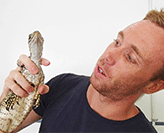Kimberley extinction prevention plan
Gene bank insures Kimberley wildlife against cane toad threat

In a series of firsts, a team of scientists led by University of Newcastle ecologists Simon Clulow and Sean Doody, have commenced work on a gene banking program to 'future proof' threatened wildlife in the Kimberley. Using a technology attempted on reptiles just once globally and never before attempted on reptiles in Australia, the team has obtained Australia's first live reptile sperm sample.
The technology, known as electro ejaculation, has yielded an important result for the gene banking program. Known as the 'Kimberley Ark', the program is an insurance policy for Kimberley wildlife expected to suffer large population declines (over 90%) from the arrival of cane toads.
"When cane toads arrive, certain species will undergo a genetic bottleneck. In other words, while they are unlikely to become extinct from the arrival of cane toads, they will lose most of their genetic diversity and their populations will crash," said Mr Clulow.
"We are collecting genetic material before species begin to decline. In future, artificial insemination can be used to restore lost genetic diversity back into wild populations," he said.
To date, no successful cryopreservation of reptiles has been undertaken anywhere in the world. The team will now develop the optimum conditions for reptile sperm cryopreservation using various methods of cold storage, freezing protocols and cryoprotectants.
"The project is a major advancement in the use of biotechnological approaches for conservation and will greatly aid the conservation of Kimberley monitor lizards as well as reptiles world-wide," said Mr Clulow.
"The development of new gene banking technologies will maximise the ability of the Kimberley ecosystem to recover from the impact it is about to receive. Cane toads arrived in the East Kimberley in 2011 and will disperse westwards and northwards through the region over the next decade," he said.
The project team also includes Colin McHenry of Monash University, Rebecca Hobbs from Taronga Zoo, and Taronga vet and zoo keeper staff.
Contact
- Sheena Martin
- Phone: +61 2 4921 8714
Related news
- Enabling access and equity in higher education
- University-school partnership project seeks to lift student outcomes
- Inspiring capable communities
- World-first platform to help understand how bushfire smoke harms the lungs and heart
- University of Newcastle Professor Appointed Chief Scientist for South Australia
The University of Newcastle acknowledges the traditional custodians of the lands within our footprint areas: Awabakal, Darkinjung, Biripai, Worimi, Wonnarua, and Eora Nations. We also pay respect to the wisdom of our Elders past and present.